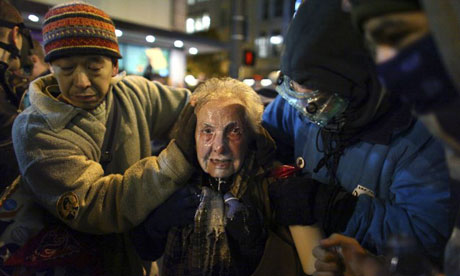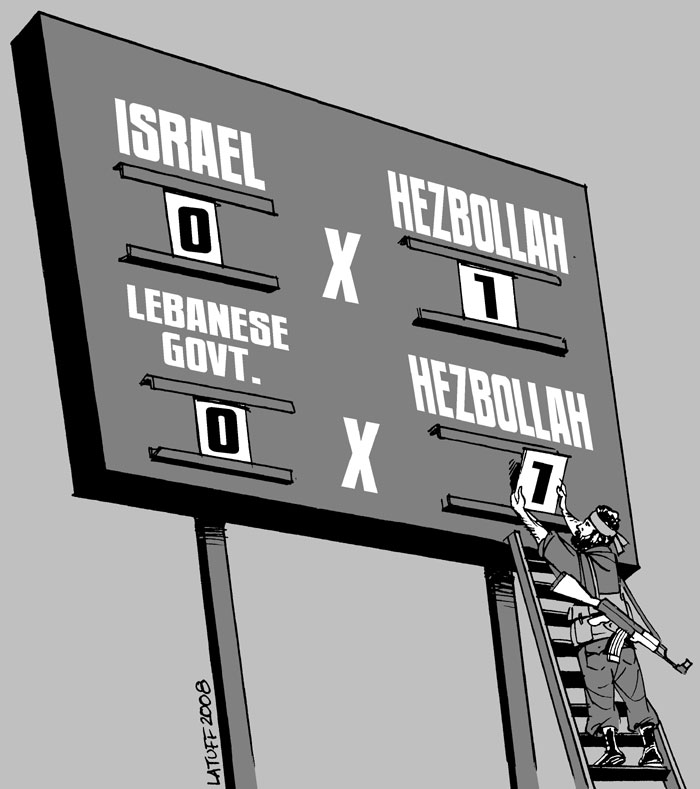The recent discussion with Lysander, Joe and others about possible Russian actions to prevent a NATO attack on Syria has lead me to conclude that it might be to look into this topic in a separate post. So here is my point of view on what Russia is really up to. As always, I offer that as a basis for discussion and I hope that you guys will contribute your points of view.
Cheers and, as always, many thanks,
The Saker
-------
Russian national security policies - a tentative list
Following Russian President Medvedev recent TV address to the Russian nation about the US anti-missile system deployment in Europe and Russia's response to it a lot of commentators have said that a "new Cold War" was possibly returning to the European continent. While not quite wrong, this characterization is dangerously misleading as it leads to associations with the old Soviet Union. That is a highly deceptive choice of words as it misses the single most important conceptual cornerstone of any sound analysis of Russian policies:
==>>Russia is not the Soviet Union<<==
(repeat three times)
(repeat three times)
This seemingly self-evident truism is still fundamentally missed in most analyses of Russian national security policies, and there are good reasons for that. After all, Putin was a KGB intelligence officer, Russia is, in many but not all aspects, a 'successor state' to the old Soviet Union, there still is a strong minority of Russians who are nostalgic for the good old days (?) of the Soviet Union and some Soviet era symbols are still seen everywhere in Russia (red stars, even statues of Lenin). But most importantly, the Western propaganda machine is constantly trumpeting that Russia is a "Soviet Union version 2", that a "resurgent Russia" means a new USSR, that under a thin veneer of change "the Russians are up to their old tricks", etc. That is, of course, utter nonsense. One need not to be a Putin-supporter to realize that Russia is a qualitatively different entity from the old Soviet Union. I won't even bother defending that self-evident fact here (if somebody doubts this, please stop reading now).
Saying that Russia is not the "Soviet Union v2" however, begs the question of what Russia really is. What are the Russians really up to? What are the actual national security policies which the "Putin-Medvedev-Putin again" regime has been pursuing since 2000 and s likely to purse on the foreseeable future. I will try to offer a summary of what I believe the national security priorities of Russia currently are in the following list.
Current Russia national security polices aims to:
- show an absolutely determined willingness to fight if Russian vital interests are threatened (08.08.08 war against Georgia)
- de-couple the EU from the US as much as possible by political and economic means (see the huge gas contracts through the north and south pipelines towards Western Europe)
- growl and bare fangs, but not quite bite, when confronted with US imperial hubris and threats (Russian response to NATO anti-missile system in Europe)
- at the UN, insist on a full compliance with international law and UNSC resolutions (that, in itself, is a major annoyance for the USA who would love to have a legal cloak for all its imperial wars)
- develop new international structures and relations (think SCO and CSTO here) to counterbalance US controlled structures
- strengthen bilateral cooperation with independent partners (China, India, Latin America)
- protect the Russian economy from the slow-motion but inexorable crash of the Western capitalist economies, mainly by reducing Russia's dependence on the West (Putin and Medvedev have done an excellent job in making the Russian economy strong while protecting it from the worst effects of the economic crisis in the West)
- dramatically increase the Russian influence over the Central Asian region and its energy-rich resources (not by sending soldiers, but by participating in the economic development of this region)
- weaken the influence of US-controlled Wahabi insurgencies by supporting the traditional forms of Islam not only in the Caucasus region, but throughout Russia, including Moscow and other big cities and by developing Russian central and regional anti-terrorist capabilities.
- use Russian economic and cultural power to slowly improve relations with the population of countries like the Ukraine, Georgia, Moldova, or Latvia whose governments have recently (or are still) run by anti-Russian governments, while reaching out to promising political figures (like Nino Burjanadze)
- avoid openly confronting or antagonizing the US Empire, in particular when the latter is engaged in self-defeating policies (war in Afghanistan)
- develop military forces capable of:
- suppressing any insurgency inside Russia
- dealing with one or two simultaneous regional crises on the Russian borders
- project enough power to protect threatened regional allies (Tajikistan? Armenia?)
- execute complex joint operations with key allies (Kazakhstan, Belarus, Kyrgyzstan, Uzbekistan and, in a second phase, possibly China)
- maintain a strategic nuclear capability sufficient to deter the US from any ideas of an attack on Russia
I would submit that this (admittedly non-official) strategy is fundamentally sound. First, in contrast to old Soviet-era policies, this Russian strategy is both doable and sustainable. Second, it is legitimate, in the sense that it is fully compatible with international law and accepted norms of civilized behavior. Third, this strategy does not threaten the legitimate interests of any other country or region. Fourth, these polices enjoy a broad consensus inside the Russian public opinion. Fifth, these policies make Russia an attractive partner for many countries who seek to remain free from US imperial control.
However, there are also some apparent down sides to these policies. The first and most obvious one is that Russia will not get involved in a direct confrontation with the West to defend any third party, be it the Kosovo Serbs, the Iranians or the Syrians. If NATO pushes hard, Russia will back down, unless its direct and vital interests are threatened. The 'best' Russia can do for those countries who are threatened by the US empire is, according to point #4 above, is insist on a compliance with international law and UNSC resolutions. Sadly, on at least two recent occasions (Iran, Libya), Russia failed to even do that. My best guess is that in both situations the leaders in the Kremlin were hoping for some quid pro quo from the USA, though I am quite unable to identify anything that the betrayal by Russia of Iran and Libya at the UNSC would have achieved for Russia (any guesses here?).
This leaves a couple of what I think of "exotic things" to explain. What were Russian Tu-160 strategic bombers doing in Venezuela? Why is the Russian Navy conducting anti-piracy operations off the coast of Somalia? What is the Russian aircraft carrier doing in the Mediterranean off the coast of Syria right now?
The reality is that none of these deployments have a serious military component. These are what the US Navy calls "showing the flag" missions, a demonstration of capabilities to potential allies and adversaries, and a way to show the Russian people that their tax money allows their country to play in the "big leagues". At no time did any of these deployment represent even a marginal threat to the USA or NATO countries (a pair of Russian attack submarines would be a far greater threat to the US Navy than the current deployment of the Kuznetsov).
Bottom line: the Russian policies will be low-key, unspectacular, gradual, aimed at the long-term, focused but unconfrontational and primarily local and regional. Unlike the Soviet Union, Russia does not believe that it is in a global zero-sum game against the USA. The leaders in the Kremlin are under no illusion about the fact that the USA is attempting to establish a world-wide empire and that it's leaders hate Russia with a passion and that western policies always aim at the eventual dismemberment and demise of Russia; they just don't believe that the Soviet way to oppose the USA was the correct one.
If there is one thing which the Russian nation has learned from the Mongol invasions is that retreating can be an extremely powerful defensive tactic and the Russians have become masters at this very refined and sophisticated art. Though this has never been mentioned officially, there is a good deal of evidence that the Kremlin has decided that letting the USA over-extend itself in all sorts of military adventures is the best way to weaken and eventually bring down the US empire.
You could say that the Russians are playing chess, while the Americans are playing monopoly.
This is, of course, a delicate, if not dangerous, balancing act. One could reasonably argue that the initial appearance of US 'success' in Kosovo, Afghanistan and Iraq resulted in the war in Georgia, or that the appearance of 'success' in Libya might now result in an attack on Syria. In fact, the one common feature of US and Israel strategic thinking is the systematic conflation of short term/tactical successes with long term/strategic gains. So when the US/Israeli Empire enjoys a short term/tactical victory, it tends to interpret that as a meaningful sign of power which results into a typical "who is next?" kind if mindset.
Russia therefore has to carefully balance letting the US/Israeli Empire over-extend itself against letting the resulting short term imperial hubris threaten important or even vital Russian national interests (see #3 above).
You could say that the Russians are playing chess, while the Americans are playing monopoly.
This is, of course, a delicate, if not dangerous, balancing act. One could reasonably argue that the initial appearance of US 'success' in Kosovo, Afghanistan and Iraq resulted in the war in Georgia, or that the appearance of 'success' in Libya might now result in an attack on Syria. In fact, the one common feature of US and Israel strategic thinking is the systematic conflation of short term/tactical successes with long term/strategic gains. So when the US/Israeli Empire enjoys a short term/tactical victory, it tends to interpret that as a meaningful sign of power which results into a typical "who is next?" kind if mindset.
Russia therefore has to carefully balance letting the US/Israeli Empire over-extend itself against letting the resulting short term imperial hubris threaten important or even vital Russian national interests (see #3 above).
These are my thoughts on this topics and I would be most interested in hearing your reactions.
Many thanks and kind regards,
The Saker

